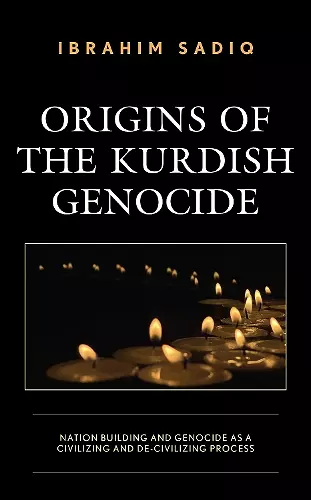Origins of the Kurdish Genocide
Nation Building and Genocide as a Civilizing and De-Civilizing Process
Format:Paperback
Publisher:Lexington Books
Published:10th Feb '23
Currently unavailable, and unfortunately no date known when it will be back
This paperback is available in another edition too:
- Hardback£85.00(9781793636829)

The author argues that a part of the history of nation building in Iraq through addressing its political characters, different communities, agreements and pan Arab ideology, including the Baath ideology and its attempts to seize power through nondemocratic methods. It is an attempt to approach the essence of the exclusion mentality of the ruling elite in order to understand the process of genocide against the Kurdish people, including all existing religious minorities.
This essence of the process has been approached in the framework of the civilizing and de-civilizing process as a main theory of the German sociologist, Norbert Elias.
Thus, this book may be considered as one of the comprehensive books to present a study of state-building in Iraq, along with identifying some of the political figures that had an essential impact on the construction. On the other hand, it is a comprehensive study of the genocide, in the sense of searching for the causes and roots of the genocide. The Anfal campaigns took place in 1988, but the process started as far back as the end of the sixties and the beginning of the seventies of the last century.
This book examines what Sadiq calls the genocide of the Kurds in Iraq, especially the Anfal campaigns that commenced in 1988 immediately following the Iran-Iraq War, including the devastating sarin gas attacks on the city of Halabja. Sadiq also documents the brutal expulsion and deaths of some 80,000 Faili Shiʽa Kurds in the late 1970s and early 1980s. The Baathist regime of Saddam Hussain expelled them on the grounds they were collaborating with the Iranians and were not “real” Arabs. The killing continued. In 1983, the regime murdered some 8,000 men of the Barzani tribal community—among the most well-known leaders of the Kurdish resistance forces in Iraq since the early 1900s—because they were considered a threat to Baath rule. The onslaught continued right up to 2014, after which ISIS continued the killing sprees, although some of its members were not Iraqis, just fanatical Sunnis like the Baathist regime. The regime condoned ISIS’s assault on the Yazidis, another religious group in northern Iraq, incarcerating more than 5,000 Yazidi girls and women and keeping them as sex slaves. One of these women, Nadia Murad, won the Nobel Peace Prize in 2018 for her valiant fight against this “genocide,” furthering the author's case. Highly recommended. General readers through faculty; professionals.
* Choice Reviews *“By applying an appropriate theory, collecting reliable evidence, and using his own lived experience, Ibrahim Sadiq has presented a painful and fantastic narrative of the Kurdish genocide, known as Anfal, which will never be forgotten."
-- Eyyûb Kerîmî, Soran University“In Origins of the Kurdish Genocide , Ibrahim Sadiq provides an excellent introduction to the circumstances and ideology behind Iraq's genocide of the Kurds, throwing light on a dark episode in modern Middle Eastern history.”
-- Marko Attila Hoare, Sarajevo School of Science and Technology“Origins of the Kurdish Genocide: Nation Building and Genocide as a Civilizing and De-Civilizing Process is a must-read study that explores the ideological foundations of the genocide of Kurds in Iraq. Although it contains some chilling anecdotes, it has successfully unravelled how state-building in Iraq in the twentieth century became a de-civilizing process that culminated in the genocide of the Kurds."
-- A.R.Sriskanda Rajah, City University of LoISBN: 9781793636843
Dimensions: unknown
Weight: 454g
246 pages